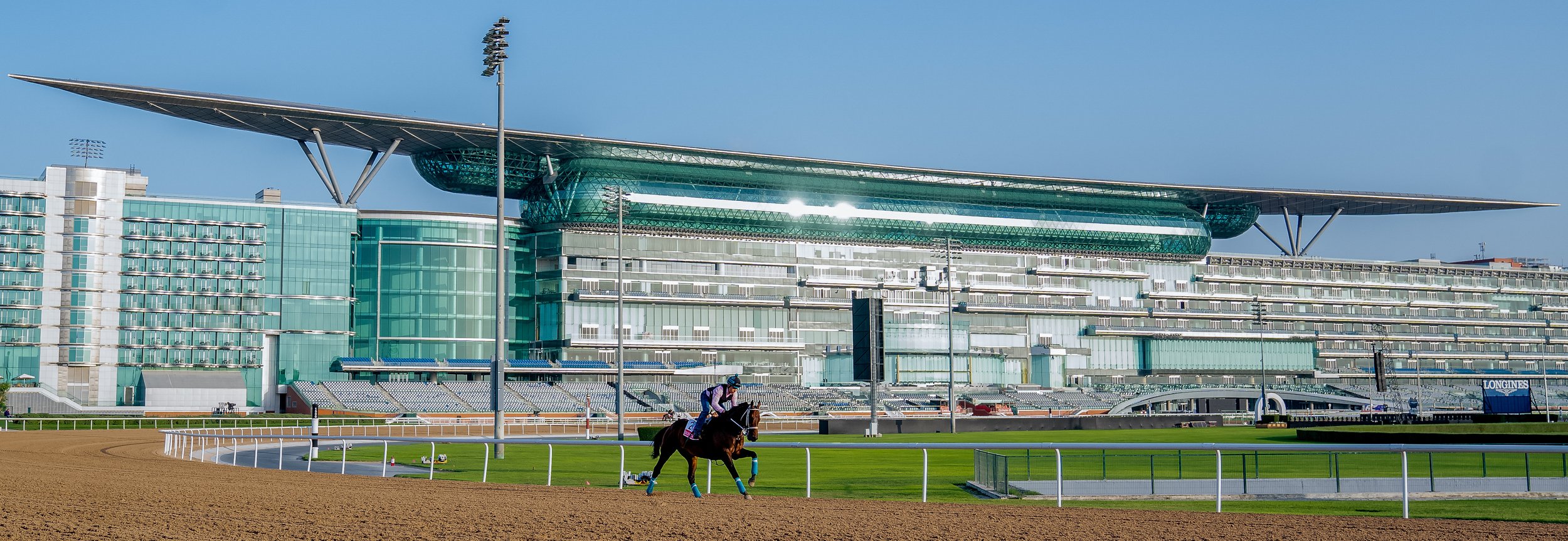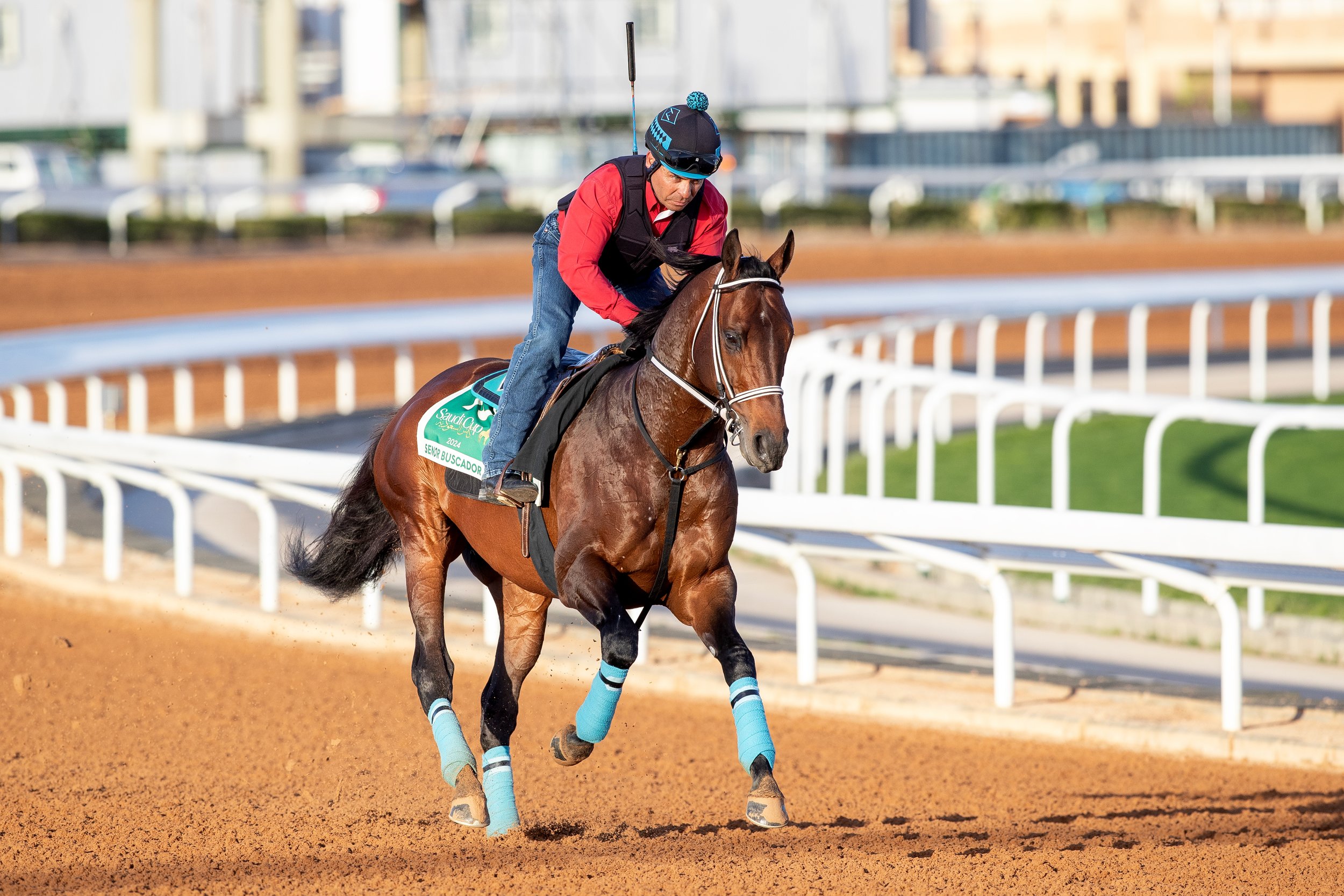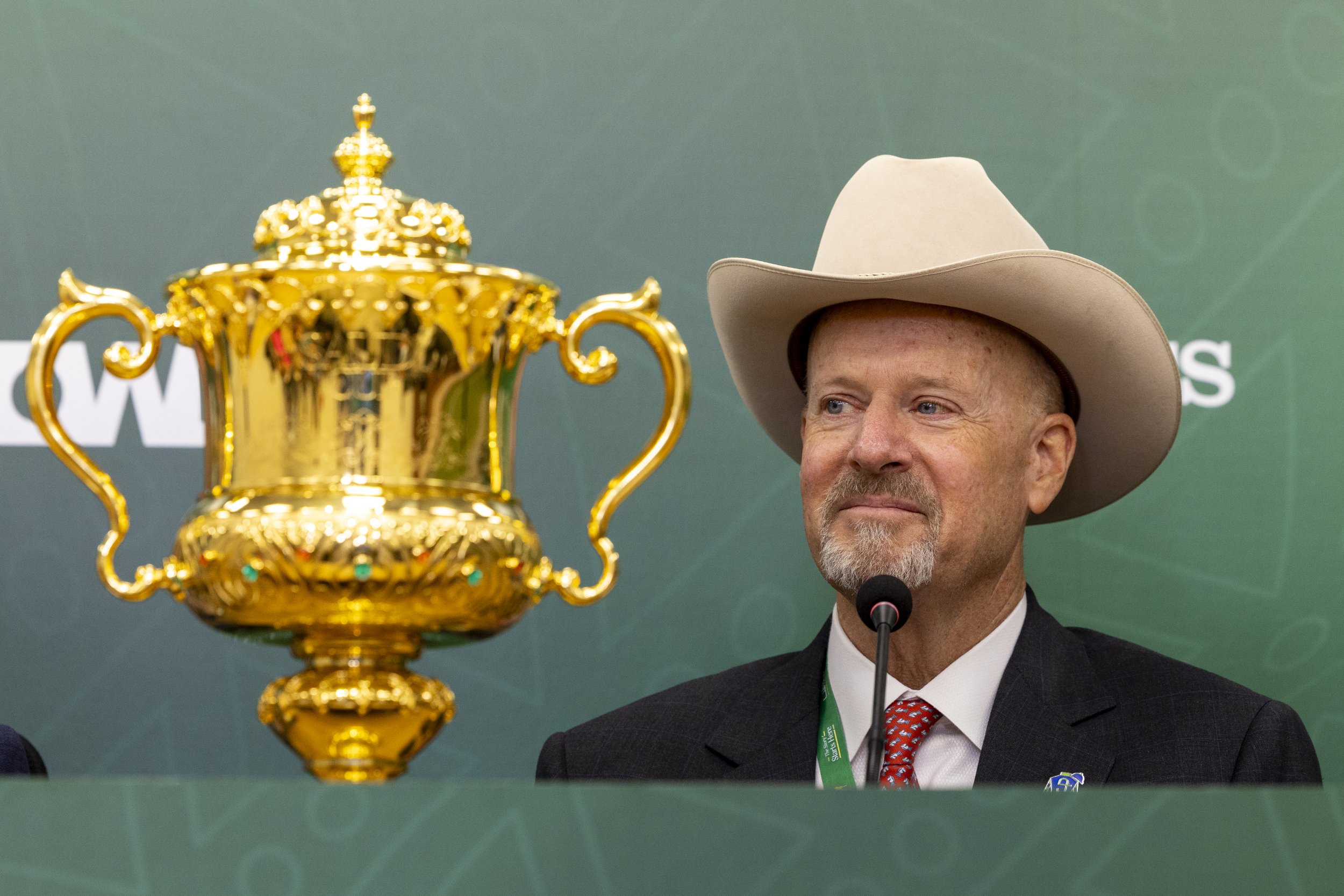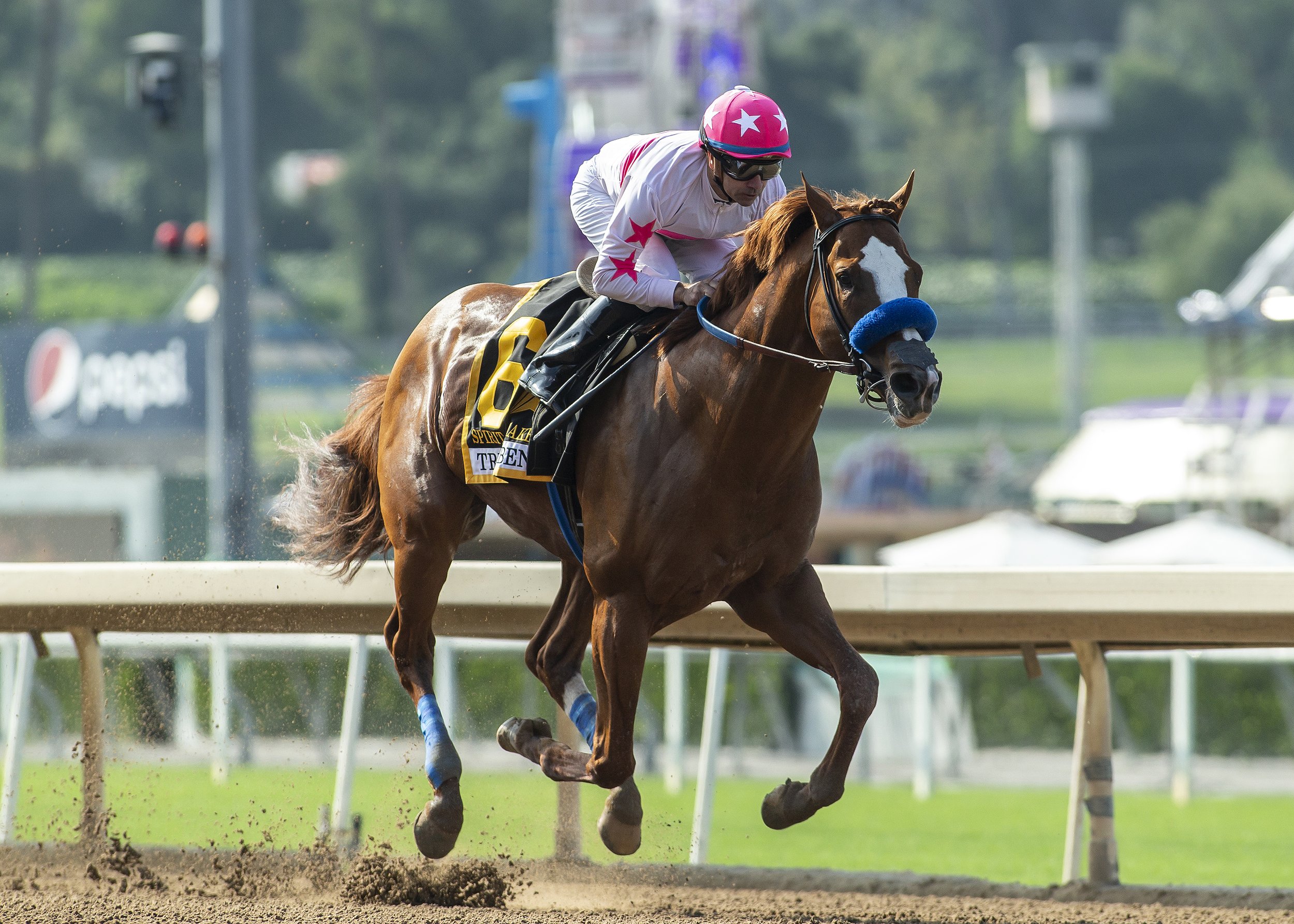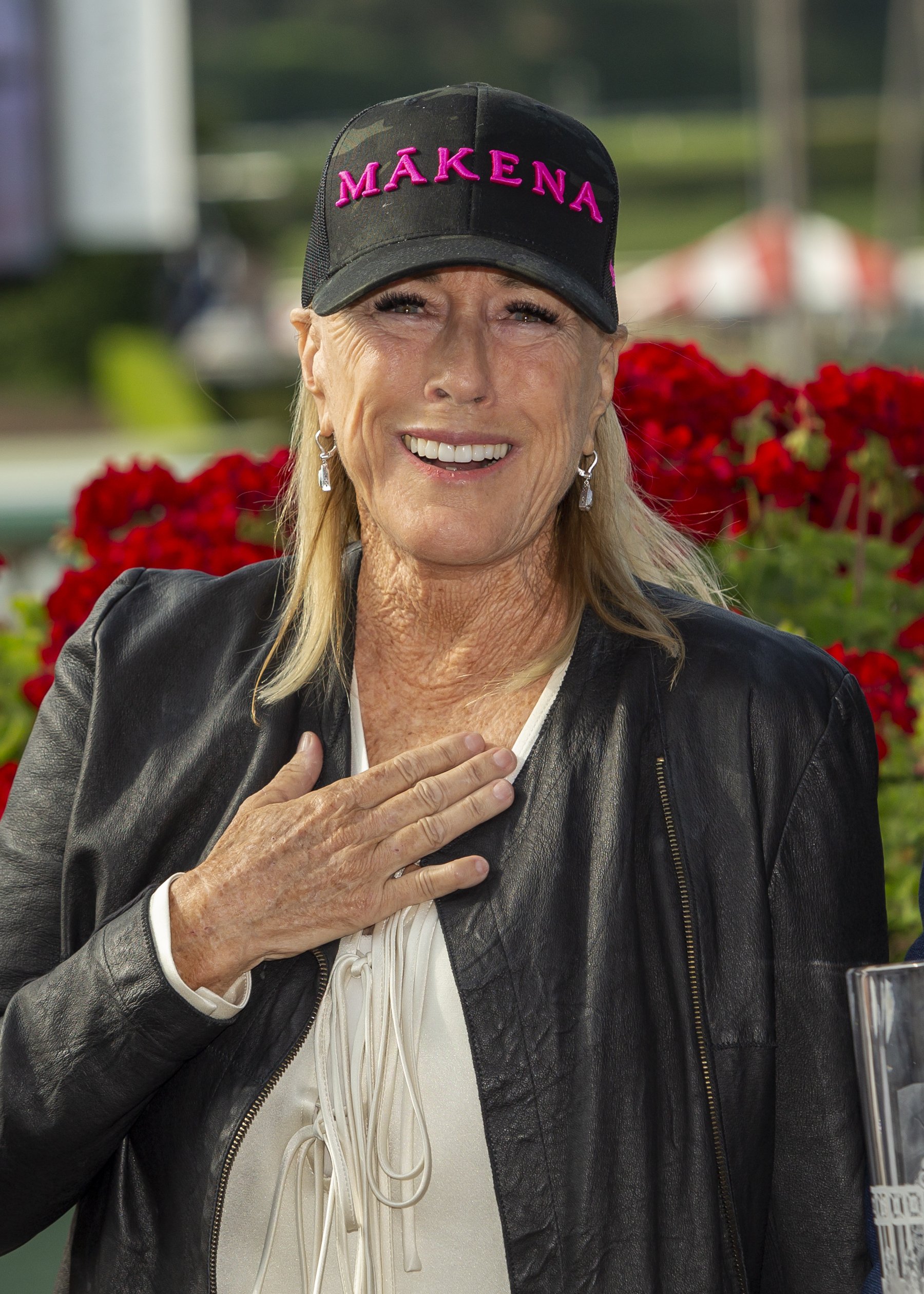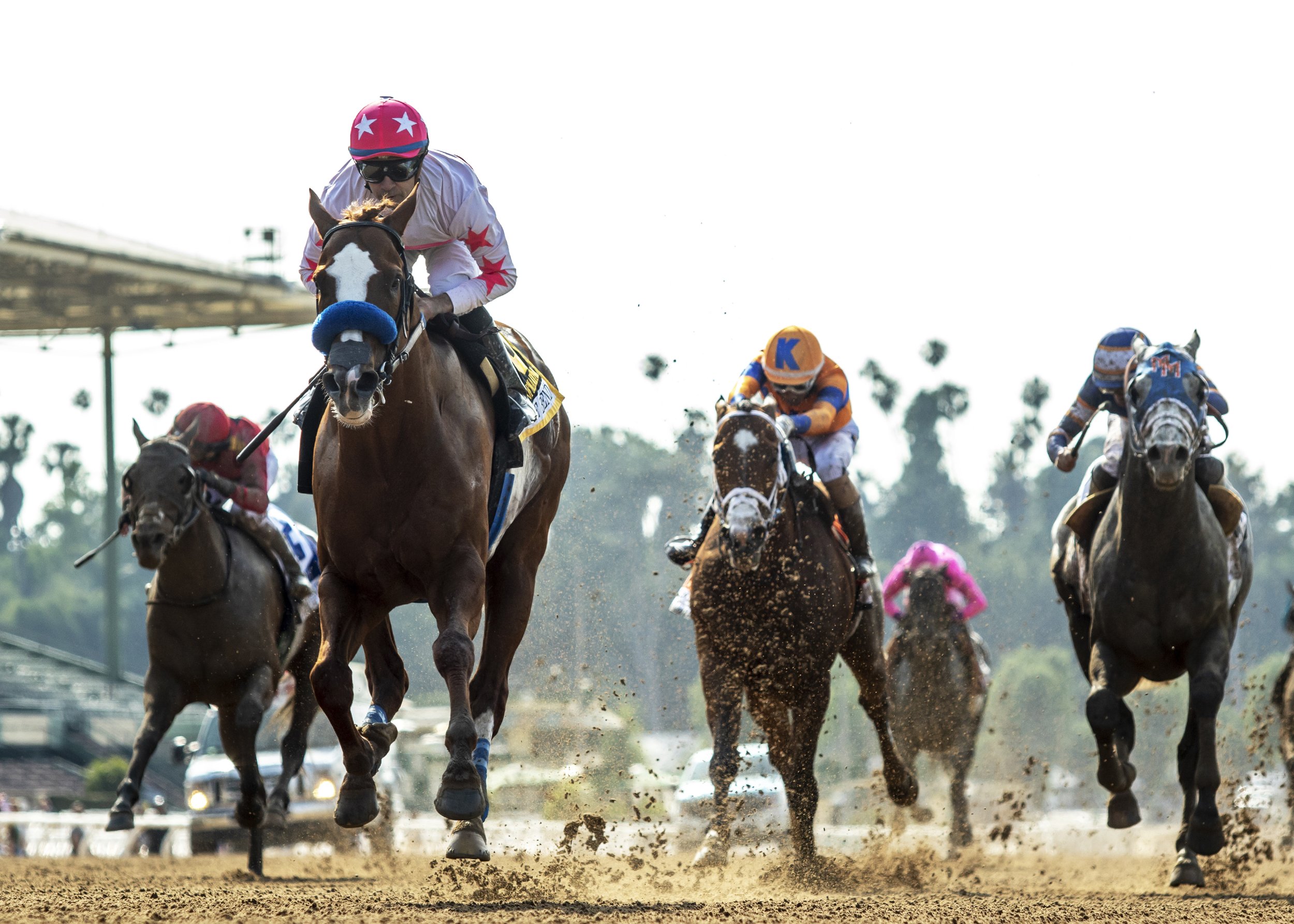Todd Fincher - From Sunland Park to Saudi Arabia
Article by Ken Snyder
Ask Todd Fincher how he got Senor Buscador from Remington Park to Riyadh and the $10 million dollar Saudi Cup winner’s purse, and you won’t get an answer; you’ll get a bunch of answers.
“There’s honesty. There’s hard work. Being able to evaluate horses and place them in the right spot. The feeding program. Your help. Not cutting corners. All that stuff.”
Got it, Todd. Now, what’s the formula for blending all of that? If it could be quantified and applied, we’d all be Thoroughbred trainers. Todd Fincher can’t tell you exactly how he arrived in the winner’s circle after the Saudi Cup. But there may be a reason why.
“You celebrate in the winner’s circle and then you walk out of there. You have your mind on other things, other responsibilities.”
At the post-race press conference, it was obvious he really had left any whooping, hollering, and hugging back in the winner’s circle. Maybe he smiled once as jockey Junior Alvarado and owner Jerry Peacock fielded questions. There’s pre-occupation and then there’s Todd Fincher pre-occupation. His mind was already on “other things,” specifically Sunland Park in New Mexico and his string of 90 horses.
He “came back immediately” from Saudi Arabia, which might have meant a red-eye flight that night. He came to Saudi Arabia as he departed, with no days or hours wasted with idle time.
“I didn’t go over until a couple of days before the race,” said Fincher. Instead, he sent assistant Oscar Rojero with Senor Buscador on the 13th of February for a race run on the 24th. Want to know about Saudi Arabia? Rojero, not Fincher, is your man.
An assessment of Fincher as a classic “big fish in a small pond” is subject to re-examination only partially because of the Saudi Cup win. Last year he shipped Senor Buscador to Del Mar to win the Grade 2 San Diego Handicap and finished second with two other horses--Flying Connection and Bye Bye Bobby in graded stakes at Del Mar. All total, his horses hit the board in graded stakes in four out of six races in San Diego. It’s not hard to imagine Fincher duplicating the success he has achieved in New Mexico in racing’s big ponds—Keeneland, Santa Anita, Saratoga, Belmont. Add to that an eye-popping 24% career win rate.
Looking back at Del Mar he understates his success considerably. “That’s starting to compete at the top level. Not Bob Baffert yet, but, you know, with the few numbers we have of those type of horses, I think we’ve done pretty well.”
Take note of that word “yet.” Fincher has thoughts of setting up a division at Del Mar in the future and is venturing into Oaklawn this year with “a few. But not a full string,” he added. Yet...
“Big farms aren’t going to look my way because I’m in New Mexico and I understand that, but I will eventually, maybe this year, start running two separate barns,” He added that he will "keep New Mexico going.”
Fincher is a defender of New Mexico racing and pointed out the state has produced both a Kentucky Derby winner in 2009 (Mine that Bird) and a Kentucky Oaks winner in 2011 (Plum Pretty).
“We got a lot of people in New Mexico who are great horsemen. You can develop a horse through our stakes schedule with good purses.”
If it’s a long way to Saudi Arabia from New Mexico, getting to Kentucky may be more manageable with more promising two-year-olds than ever in his barn.
“Last year when I broke babies, I had two Kentucky-breds. Two fillies and one colt.
“This year I had some people step up and fill my barn a little more. We broke fifteen yearlings this year that are Kentucky-breds or Louisiana-breds.
“It’s just very rare for me to get that many,” he added.
Roots in New Mexico run deep for the 52-year-old Fincher. His grandfather, Albert, was a trainer stabling at the old La Mesa Park in Raton, New Mexico as well as at Sunland. Albert’s son, Leroy—Todd’s father—also trained Quarterhorses and Thoroughbreds after a jockey career. As if that isn’t enough pedigree, Todd’s mom Leslie trained Quarterhorses and Thoroughbreds.
It is said that half of life is just showing up. Fincher has had only the other half to figure out. The major lesson he got from family was “Show up every day to work. That’s basically what I derived from my family.
“I worked in the barn. We had jobs at the barn. I would do the water buckets and he would do the hay bags. We were in charge of holding horses for the baths and raking the shedrow. I’m talking from an early age—probably nine, ten years old.”
New Mexico racetracks were also a playground for the Fincher boys. “Your parents would be working, and you’d be running around the grandstands walking back to the barn screwing around and just running loose basically.”
“Play” also included putting down a bet or two at the betting windows with mutuel clerks who knew the Fincher boys. “I could barely reach up to the window. I‘d put my two dollars up there and bet at an early age. That was illegal, but back then everything was a little quieter. “
Fincher’s dream was to follow in the family bootsteps and become a jockey. The lanky, six-feet tall averaged a respectable 14% win rate before waving the white flag to weight after ten years of riding in 1997 and immediately hung up his own shingle the next year. Fincher never worked as an assistant but started with eight horses, the most expensive of which was $5,000.
Transitioning from jockeying to training might have been the equivalent of a family doctor performing brain surgery. “The one thing that really shocked me about training is how much I didn’t know.
“You’ve heard jockeys don’t make good trainers. That’s basically because they’re two completely different jobs.
“There’s a lot of jockeys that don’t know horses. They just learned how to ride a horse and that’s all,” he added.
He believes his time on the ground grooming as an adolescent and teenager for his dad taught him the importance of understanding a horse. When it came time to sit astride one and break from the gate, that experience was invaluable…to a point.
“I could get on a horse and tell you everything about it…evaluate the horse.
“As a trainer watching, it was a brand new thing. It took a long time to be able to watch a horse and differentiate certain things about a horse—how good they looked when they were running, if they’re just average. Watching the horse move was the biggest challenge, I think.
“You learn from there, then the next year you get some more horses, and every year from then on. It’s grown, and we’re pointing for the quality and not the quantity. We kind of have both now.”
Fincher says 90% of his horses come to him as yearlings. “If I have somebody bugging me to claim horses, we will, but I really have no interest.
“You claim a horse, odds are you pay twenty-thousand dollars, and you got a twenty-thousand dollar horse.
“We’re looking for the home runs to develop a horse into a classic-type horse or stakes winner—the top level.”
Mission accomplished. They don’t get any more top level than Senor Buscador and the Saudi Cup and Fincher knew it.
He was confident the horse could beat the best in the world if he got an honest pace.
“As far back as he gets, he can get himself in a lot of trouble,” said Fincher. True to form, Buscador was far behind the field by as many as six lengths, loping along next to Japanese starter Ushba Tesoro. Entering the stretch, Senor Buscador fell in behind the Japanese entry then popped out from behind him to the outside. Again, true to form, he spotted Ushba Tesoro as much as three lengths in the stretch before cruising by ten horses, including his Japanese runner by a nose at the wire.
“I think he just lets them get after it first and enjoys running by horses. That’s exactly what it is. He’s got enough speed. He can go to the front if he wanted but he refuses.”
For Fincher, with his total focus, it’s not hard to believe that “validation and vindication” for Senor Buscador meant more than the purse. “Everybody talks about the purse, which is outstanding. For him to beat the best horses in the world was much, much greater for me than the value of the race.
“I’ve been making excuses for this guy for a long time knowing how good he is.”
Adapting to the horse rather than the other way around might have been still another additional factor in the win. “If I really tried, I guess I could probably change his running style, but I think it would be detrimental to him.
“The ability is there, and I think he’s the best horse. I don’t question that.”
Fincher’s abilities as a trainer sort of mirror Senor Buscador’s performance in the Saudi Cup. All the horse needed was a clean trip. All that Fincher needs is the opportunities. Racing has probably not seen the last of him at center stage like the winner’s circle at King Abdulaziz Racecourse, but you’ll have to hurry to catch him before he’s gone.
Other things. Other responsibilities.
Todd Fincher would amend lyrics to an old song from the 1950’s movie Cinderella "A Dream Is a Wish Your Heart Makes" to “A Dream is a Wish your Hands and Feet Make.”
The dots don’t connect between Sunland Park and Ruidoso Downs in New Mexico and King Abdulaziz Racecourse in Saudi Arabia and Meydan Racecourse in Dubai…unless you’re Todd Fincher.
A win in the $20 million Saudi Cup with Senor Buscador and a third place showing in the Dubai World Cup (earning a mere $1.2 million) are dreams most trainers wouldn’t ever entertain.
For those who know him any length of time, it is no surprise to hear him say on reaching the highest of heights in racing, “I’ve always been planning on it and hoped to get there. Those are goals that I set. I hope we can reach some more goals pretty soon.”
Gulp.
At first you might not take him seriously until you consider that, well, he did it once, and yes, he did it based in Sunland Park, New Mexico.
Asked what he did after Saudi Arabia and Dubai, the laconic cowboy simply said, “Came home and went back to work. That’s what we do. Go to work every day.”
And make dreams come true.
Graded Stakes Winning Owners - Kris Chandler (Spirit of Makena)
Article by Bill Heller
Spirit of Makena wins the 2023 Triple Bend Stakes at Santa Anita.
When Kris Chandler’s five-year-old horse Spirit of Makena, owned and bred by her recently-deceased husband Bruce, captured the Grade 3 San Carlos Stakes at Santa Anita, March 1st, in his stakes debut, Kris Chandler watched on TV. When trainer George Papaprodromou pointed Spirit of Makena to the Grade 2 Triple Bend Stakes at the same track May 27th, Chandler decided to watch the race in person. “It was the first time I went to the track in four years,” Chandler said.
It was worth the wait. Spirit of Makena won the Triple Bend by a length and a quarter under Joe Bravo, making him four-for-five lifetime. “It was emotional on a lot of levels,” Chandler said. “Horse racing was his passion, and he waited a lifetime for this. He had horses for over 40 years and never had a horse like this. So it’s beyond special.”
Patience allowed Spirit of Makena to develop. A variety of issues delayed his career debut until August 5th, 2022, when he won by 2 ¼ lengths as a four-year-old. A head loss finishing second in an allowance race has been his only blemish. Working around quarter cracks, Spirit of Makena won an allowance race before tacking on a pair of graded stakes victories.
The one with Chandler there was unforgettable. “She was very happy, very emotional,” Papaprodromou said. “She wished Bruce was there with her. I got to meet Bruce. They’re great people and he’s a nice horse. I’m grateful to train a horse like that and I would like to thank the owners for giving me a horse like that. It’s great to train for them. We are looking forward to a nice future with him.”
That future will help Chandler move on with her life after losing Bruce last October 16th, the day before their anniversary, following a four-year battle with cancer. “I met Bruce in Maui in Hawaii 26 years ago,” Chandler said. “Bruce and I did horses together. I’ve always loved horses, since I was a little kid, with my dad.”
Bruce Chandler’s family owned The Los Angeles Times and its parent, the Times Mirror Company, for decades.
Kris Chandler got more involved with her husband’s horses over the years. “Because I paid attention to the breeding,” she said. “He named me Director of Breeding. That was his title for me. He was breeding to horses in California. I convinced Bruce to breed to Ghostzapper (in Kentucky). I said, 'This is a great sire.’ I convinced him that if you want to get a good horse, you must breed to a good horse.
Spirit of Makena’s dam, Win for M’lou by Gilded Time, was bred by the Chandlers and named for Kris’s mom. “My mom got so excited,” Chandler said. “She was going to be famous.”
Somewhat. Win for M’lou became the Chandler’s first $100,000 winner ($115,230), surpassed only by Mai Tai ($140,405). Spirit of Makena has taken the Chandlers to a new level, having already earned $347,600 in just five starts.
Unfortunately, Spirit of Makena took forever to make it to the races. And Bruce became ill. “He got sick in 2019,” Chandler said. “He wanted to keep going. Our favorite place in the world is Maui, and part of it was because he had to live there the past few years. I’ve been taking care of my husband for the last four years. His mobility got worse and he couldn’t travel. Horse racing was the only thing he could watch. It’s still emotional being without him right now.”
She’s had and still has a ton of support from her Hawaiian community. She lives on Makena Road in Makena. “Everyone in Hawaii is behind the horse,” Chandler said. “The McKenna Golf and Beach Club are like family. The general manager, Zak Fahmie, sent a letter to all the members about this horse, a once-in-a-lifetime horse. He’s kind of like a miracle horse. We didn’t think he was going to get to the racetrack. He was at the farm in California for two years. For him to be a horse like this, it’s a miracle. From being so injured to being such a great horse. It’s a great story. We took our time with him. He’s getting better. He’s just a wonderful horse, very intelligent. You can pet him.”
Spirit of Makena keeps her and her husband connected. Initially, after her husband passed, Chandler thought she was going to get out of racing. Now she has a horse who may take her to the Breeders’ Cup Sprint at his home track, Santa Anita. “I’m trying to get out, but this is getting me very excited,” she said. “Having a horse like this, I kind of feel Bruce’s spirit. I think he just knows.”




